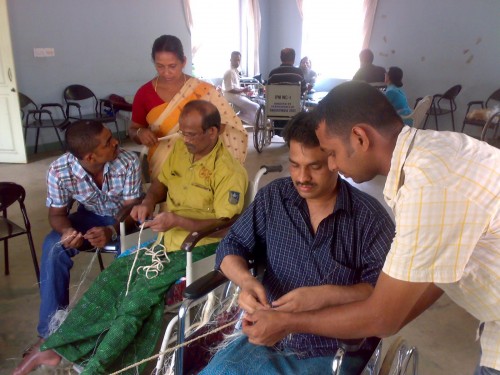Palliative Care Initiatives in Kerala
The power of healing does not lie in just prescribing drugs and medical treatment. What it essentially requires is caring for the patients. Palliative care is a specialized area of
The power of healing does not lie in just prescribing drugs and medical treatment. What it essentially requires is caring for the patients. Palliative care is a specialized area of healthcare that focuses on relieving and preventing the suffering of patients. It includes care of the patient and family, pain and symptom management, disease-modifying treatments, psychological, social, spiritual support and bereavement support. This is exactly what the Neighborhood Network in Palliative Care (NNPC) in Kerala does for patients.
Realising that for the chronically/terminally ill, services should be available 24/7, the network was started as a set of community owned projects. Mohammed Saif, State Project Manager at the National Rural Health Mission (NRHM) is closely involved in the projects. He explains, “These are supported by a volunteer base that includes health care professionals who provide social support, self esteem, identity and perceptions of control by showing better understanding and cooperation in responding to the challenges faced by the community.”
Working with the government
In essential services such as health and education, government support is a great add-on for most grassroots revolutions. Today, Kerala is the only state with an NRHM project in palliative care. The project, started in 2008, has been working on the implementation of the Palliative Care policy of the Government of Kerala.
What has been the impact of such alliance? “The network was highly successful in delivering sustainable and meaningful palliative and long term care with community participation. The impact of the initiative was so fruitful that the Government of Kerala released a pain and palliative care policy. There has been a lot of awareness generation by events such as Kayyoppu, a signature campaign organised in 2010 to brighten the days of patients who are suffering by creating awareness on palliative care and raising resources from the community. Over one lakh people participated. A seminar on palliative care in campus then saw participation from nearly 700 students.”
Two-third of the palliative care initiatives of the country are in Kerala. There are more than 200 community based organizations running palliative care initiatives in the state in addition to the 300 Government palliative care initiatives.

The methodology
- Getting people from a region together
- Discussing the problems of the patients and their family
- Enlisting the support of those willing to spend a minimum of two hours per week
- Structured training
- Encouraging the group to plan and organize locally relevant services
- Defying action plan in association with the health care professionals
- Mobilizing fund for the project locally
Student involvement
The success of NNPC made the volunteers think about the possibility of involving youth, especially students in this network. “We could easily identify many areas where there was a concrete role for students like fund raising, spreading awareness and even providing psychological support to the needy. We hence started an initiative called Students in Palliative Care (SIPC) to organise adequate and affordable support programs for the bedridden, the incurably ill and the dying people in Kozhikode. The kind of support we are getting from mentors, parents, teachers, etc has been very encouraging,” says Saif.
Read real experiences at http://saifnotes.blogspot.com/
This story made me
- 97
- 121
- 89
- 167










